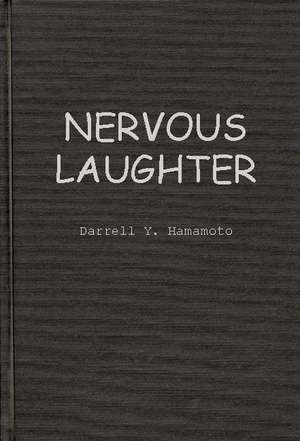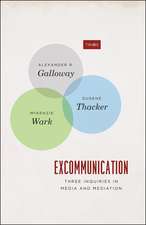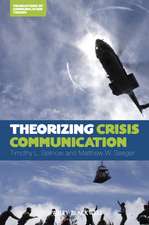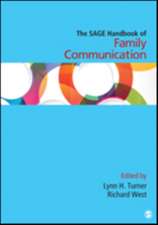Nervous Laughter: Television Situation Comedy and Liberal Democratic Ideology: Washington Papers (Hardcover)
Autor Darrell Y. Hamamotoen Limba Engleză Hardback – 16 mai 1989
Nervous Laughter examines 40 years of situation comedy, decade by decade, providing the first truly panoramic view of TV's most popular dramatic form. Within this context, Hamamoto traces what he describes as the dominant liberal democratic ideology implicit within situation comedy and explains its enduring popularity. Critically analyzing four decades of television situation comedies from "The Honeymooners" to "The Bill Cosby Show," Hamamoto shows how the sitcom reflects, explains, legitimates, and challenges the society in which it is grounded, illuminating the power of laughter both to reaffirm and to question existing social structures. . . . Hamamoto offers a well-researched and refreshingly lucid study, immensely readable for its astute scholarship. Indispensable for students and scholars of television, popular culture, and comedy. "Choice"
"Nervous Laughter" examines forty years of situation comedy, decade by decade, providing the first truly panoramic view of TV's most popular dramatic form. Within this context, Hamamoto traces what he describes as the dominant liberal democratic ideology implicit within situation comedy and explains its enduring popularity. Examining liberal democratic culture, politics, and society he demonstrates how the sitcom resolves social contradictions. Borrowing freely from the social sciences, history, and literary criticism he explains the curious grip the TV sitcom has had on its audience for over forty years. This book critically assesses the relationship between the media and society bringing questions of power, equality, and democracy to the foreground. "Nervous Laughter" is important reading for both the specialist and the general reader in its analysis of postwar American society.
Nervous Laughter is a study of liberal democratic culture, politics, and society. It describes the ways affirmative aspects and contradictions of liberal democratic ideology are given form in television situation comedy. It provides a close reading of forty years of television texts. Arguing against mainstream theories of mass communications, the author presents an analytic framework that looks instead at conflict and contradiction within class society. Challenging the legitimacy of airwave control by non-democratic social institutions, "Nervous Laughter" concludes with a modest agenda that might lead to democratization of television.
| Toate formatele și edițiile | Preț | Express |
|---|---|---|
| Paperback (1) | 178.08 lei 6-8 săpt. | |
| Bloomsbury Publishing – 29 mai 1991 | 178.08 lei 6-8 săpt. | |
| Hardback (1) | 436.57 lei 6-8 săpt. | |
| Praeger Publishers – 16 mai 1989 | 436.57 lei 6-8 săpt. |
Din seria Washington Papers (Hardcover)
- 38%
 Preț: 344.47 lei
Preț: 344.47 lei - 24%
 Preț: 460.51 lei
Preț: 460.51 lei - 37%
 Preț: 355.12 lei
Preț: 355.12 lei - 27%
 Preț: 439.85 lei
Preț: 439.85 lei - 37%
 Preț: 349.11 lei
Preț: 349.11 lei - 32%
 Preț: 354.20 lei
Preț: 354.20 lei - 38%
 Preț: 343.88 lei
Preț: 343.88 lei - 38%
 Preț: 344.31 lei
Preț: 344.31 lei - 32%
 Preț: 354.76 lei
Preț: 354.76 lei - 38%
 Preț: 344.15 lei
Preț: 344.15 lei - 38%
 Preț: 344.47 lei
Preț: 344.47 lei - 19%
 Preț: 234.86 lei
Preț: 234.86 lei - 40%
 Preț: 376.50 lei
Preț: 376.50 lei - 32%
 Preț: 353.55 lei
Preț: 353.55 lei - 40%
 Preț: 376.15 lei
Preț: 376.15 lei - 28%
 Preț: 344.90 lei
Preț: 344.90 lei - 38%
 Preț: 344.47 lei
Preț: 344.47 lei - 32%
 Preț: 352.58 lei
Preț: 352.58 lei
Preț: 436.57 lei
Preț vechi: 707.08 lei
-38% Nou
83.56€ • 90.80$ • 70.24£
Carte tipărită la comandă
Livrare economică 22 aprilie-06 mai
Specificații
ISBN-10: 0275928616
Pagini: 189
Dimensiuni: 152 x 229 x 14 mm
Greutate: 0.45 kg
Editura: Praeger Publishers
Colecția Praeger
Seria Washington Papers (Hardcover)
Descriere
Nervous Laughter examines forty years of situation comedy, decade by decade, providing the first truly panoramic view of TV&Apos;s most popular dramatic form. Within this context, Hamamoto traces what he describes as the dominant liberal democratic ideology implicit within situation comedy and explains its enduring popularity. Examining liberal democratic culture, politics, and society he demonstrates how the sitcom resolves social contradictions. Borrowing freely from the social sciences, history, and literary criticism he explains the curious grip the TV sitcom has had on its audience for over forty years. This book critically assesses the relationship between the media and society bringing questions of power, equality, and democracy to the foreground. Nervous Laughter is important reading for both the specialist and the general reader in its analysis of postwar American society.
Nervous Laughter is a study of liberal democratic culture, politics, and society. It describes the ways affirmative aspects and contradictions of liberal democratic ideology are given form in television situation comedy. It provides a close reading of forty years of television texts. Arguing against mainstream theories of mass communications, the author presents an analytic framework that looks instead at conflict and contradiction within class society. Challenging the legitimacy of airwave control by non-democratic social institutions, Nervous Laughter concludes with a modest agenda that might lead to democratization of television.








